De Libanese dichter en romanschrijver Khalil Gibran werd geboren op 6 januari 1883 in Bischarri. Zie ook alle tags voor Khalil Gibran op dit blog.
Uit: Spiegels van de ziel
Als je staat aan het begin van je kennen,
sta je aan het begin van je voelen.
Wie alleen kan zien wat het licht onthult
en alleen kan horen wat het geluid verkondigt,
ziet en hoort eigenlijk niets.
De werkelijkheid van iemand anders
is niet gelegen in het feit wat hij je onthult
maar in wat hij je niet kan onthullen.
Als je hem dus wilt begrijpen
luister dan niet naar wat hij zegt,
maar veel meer naar wat hij niet zegt.
Jij en ik blijven vreemden voor het leven,
voor elkaar en voor onszelf,
tot de dag waarop jij spreekt en ik luister
omdat ik meen dat jouw stem mijn eigen stem is
en ik, wanneer ik voor je sta,
meen dat ik mezelf zie staan voor een spiegel.
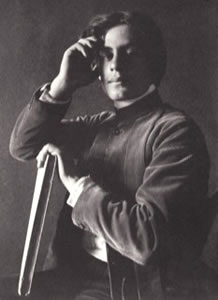
Khalil Gibran (6 januari 1883– 10 april 1931)
De Nederlandse dichteres Hester Knibbe werd geboren op 6 januari 1946 in Harderwijk. Zie ook alle tags voor Hester Knibbe op dit blog.
Ze liepen met kaarsen de berg op
Ze liepen met kaarsen de berg op
en zongen daarbij een muziek die klonk
als klagen dat door het licht omhoog
werd gedragen. Hem droegen ze
levend en dood, de moeder droegen ze
ook, maar die wankelde zo alsof de dragers
er de brui aan gaven. Die er waren
sloten zich aan bij de stoet: een schare donker
en licht die zingend of zwijgend
bleef klimmen en dalen.
Een vader
Beland op zoiets als een eiland alleen
zoekt ze zich iemand. Neemt dan
bijvoorbeeld de man die van zee komt,
ontvangt en bedient hem en als hij dan
gaat, richt ze een hier voor hem in voor
als hij terugkeert, als ze weer wil. Wachten
maakt deel van haar lijf uit voortaan en
denken hoe was hij, wier aan zijn voeten
in zijn handen een net – Hij is het! Zo
worden goden gevonden door vrouwen, zij
bouwen een altaar, brengen hun zonen,
dochters erheen en zeggen: je vader.
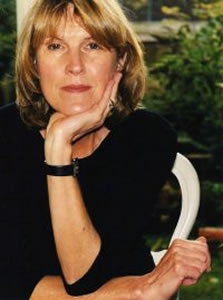
Hester Knibbe (Harderwijk, 6 januari 1946)
De Franse schrijver Romain Sardou werd geboren op 6 januari 1974 in Boulogne-Billancourt. Zie ook alle tags voor Romain Sardou op dit blog.
Uit: L’éclat de Dieu
„Le halo informe d’une torche à résine glissait lentement sur les parois du souterrain. La galerie, creusée à plus d’une dizaine de mètres de la surface, était grise et poussiéreuse ; elle absorbait partout la lumière blonde sans en rien refléter.
Un homme seul conduisait le flambeau. Grand, âgé, il portait des haillons de caravanier, des sandales usées, une sacoche de toile et un turban négligé qui lui tombait sur les épaules. Ses lèvres étaient fines et décolorées, son front tout en noeuds, le cou fermé par une barbe courte et blanche. Il représentait assez un pilleur de sanctuaires ou un aventurier. Seule une bague à sa main gauche, frappée d’un fragment du Coran et d’un poinçon mystérieux, attestait d’une condition plus digne.
(…)
Il reprit sa progression, plus lentement, redoutant qu’une tenaille encore tendue ne lui brise le talon. La salle aux pièges défendait l’accès d’une seconde rotonde. Il n’y avait ici aucune apparence de porte ni d’ouverture. Seules quelques niches de statues ornaient la chambre vide. Le visage du savant se renfrogna. C’était là que tout se jouait. Les faux souterrains n’allaient jamais outre cette mauvaise fin. Les indices suivants, précieusement enregistrés dans son rouleau, étaient inutiles : il butait toujours contre cette impasse.
Le vieil homme s’essuya le front.
Il approcha des niches et des statues.“
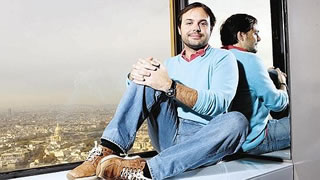
Romain Sardou (Boulogne-Billancourt, 6 januari 1974)
De Duitse schrijver Jens Johler werd geboren op 6 januari 1944 in Neumünster. Zie ook alle tags voor Jens Johler op dit blog.
Uit: Knigge, Castiglione und die Ehrlichkeit
„Grußlos und ohne sich vorzustellen, schon gar ohne Blumen für die Gastgeberin, platzt er in eine Abendgesellschaft hinein, greift sich mit bloßen Fingern ein Stück Fleisch von irgendeinem Teller, verschüttet Rotwein auf dem Teppichboden über der zuvor dort ausgetretenen Zigarette und sagt, da ihm nun einmal danach ist, den Anwesenden allerlei Wahrheiten ins Gesicht. Anschließend verschwindet er so, wie er gekommen ist. Natürlich ohne sich zu bedanken.
Vielleicht liefert er auch nur einen Ausschnitt dieses Repertoires oder eine andere Variante, dann sind wir dieser Kerl womöglich selbst. Aber wer immer es auch sein mag, und wie er es nun im einzelnen gebracht hat, wir sind imstande, sein Verhalten mit dem Hinweis darauf zu entschuldigen, er habe sich wenigstens “nicht verstellt”. Er habe sich eben so verhalten, wie er sei. Und so sei er nunmal. Er sei zwar nicht höflich, aber er sei immerhin ehrlich. Als wäre Ehrlichkeit ein Freibrief oder eine Legitimation für schlechtes Benehmen.
Tatsächlich ist sie das. Ehrlichkeit ist der Hammer, mit dem die Jugend (seit einigen Jahrzehnten) hergebrachte Verhaltensformen zerschlägt, nicht um erstarrte Formen durch neue zu ersetzen, sondern um in einer linkischen Formlosigkeit zu verharren. Das gilt seit 1968 auch für die “reifere” Jugend. Wir haben es nicht gelernt, uns zu benehmen, oder wenn, dann haben wir – “chassez le flic dans votre tete” – uns erfolgreich darum bemüht, das Gelernte zu vergessen; im Namen der “Ehrlichkeit”, der “Echtheit”, der “Spontaneität”, oder wie immer die Begriffe für das, was “aus dem Bauch” kommt, lauten mögen.
Das Merkwürdige ist nur: die Formlosigkeit macht keinen Spaß. Sie ist langweilig. Oder brutal. Sie verdirbt jedes Spiel. Solange es noch Regeln gibt, kann Regelverletzung amüsant sein, aber danach? Der Sieg des “Bauches” über den “Kopf” ist immer ein Pyrrhussieg. Dr. Jekyll ist interessant, weil Mr. Hyde in ihm steckt – der losgelassene Mr. Hyde ist nur ein Ennui.“
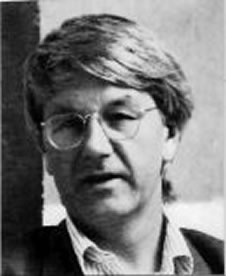
Jens Johler (Neumünster, 6 januari 1944)
De Amerikaanse schrijver Edgar Laurence Doctorow werd geboren op 6 januari 1931 in New York. Zie ook alle tags voor E. L. Doctorow op dit blog.
Uit: City Of God
„So the theory has it that the universe expanded exponentially from a point, a singular space/time point, a moment/thing, some original particulate event or quantum substantive happenstance, to an extent that the word explosion is inadequate, though the theory is known as the Big Bang. What we are supposed to keep in mind, in our mind, is that the universe didn’t burst out into pre-existent available space, it was the space that blew out, taking everything with it in a great expansive flowering, a silent flash into being in a second or two of the entire outrushing universe of gas and matter and darkness-light, a cosmic floop of nothing into the volume and chronology of spacetime. Okay?
And universal history since has seen a kind of evolution of star matter, of elemental dust, nebulae, burning, glowing, pulsing, everything flying away from everything else for the last fifteen or so billion years.
But what does it mean that the original singularity, or the singular originality, which included in its submicroscopic being all space, all time, that was to voluminously suddenly and monumentally erupt into concepts that we can understand, or learn-what does it mean to say that … the universe did not blast into being through space but that space, itself a property of the universe, is what blasted out along with everything in it? What does it mean to say that space is what expanded, stretched, flowered? Into what? The universe expanding even now its galaxies of burning suns, dying stars, metallic monuments of stone, clouds of cosmic dust, must be filling … something. If it is expanding it has perimeters, at present far beyond any ability of ours to measure. What do things look like just at the instant’s action at the edge of the universe? What is just beyond that rushing, overwhelming parametric edge before it is overwhelmed? What is being overcome, filled, enlivened, lit? Or is there no edge, no border, but an infinite series of universes expanding into one another, all at the same time? So that the expanding expands futilely into itself, an infinitely convoluting dark matter of ghastly insensate endlessness, with no properties, no volume, no transformative elemental energies of light or force or pulsing quanta, all these being inventions of our own consciousness, and our consciousness, lacking volume and physical quality in itself, a project as finally mindless, cold, and inhuman as the universe of our illusion.“
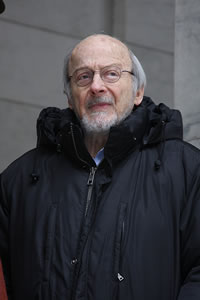
E. L. Doctorow (New York, 6 januari 1931)
De Amerikaanse dichter Carl Sandburg werd geboren op 6 januari 1878 in Galesburg, Illinois. Zie ook alle tags voor Carl Sandburg op dit blog.
A Father To His Son
A father sees his son nearing manhood.
What shall he tell that son?
‘Life is hard; be steel; be a rock.’
And this might stand him for the storms
and serve him for humdrum monotony
and guide him among sudden betrayals
and tighten him for slack moments.
‘Life is a soft loam; be gentle; go easy.’
And this too might serve him.
Brutes have been gentled where lashes failed.
The growth of a frail flower in a path up
has sometimes shattered and split a rock.
A tough will counts. So does desire.
So does a rich soft wanting.
Without rich wanting nothing arrives.
Tell him too much money has killed men
and left them dead years before burial:
the quest of lucre beyond a few easy needs
has twisted good enough men
sometimes into dry thwarted worms.
Tell him time as a stuff can be wasted.
Tell him to be a fool every so often
and to have no shame over having been a fool
yet learning something out of every folly
hoping to repeat none of the cheap follies
thus arriving at intimate understanding
of a world numbering many fools.
Tell him to be alone often and get at himself
and above all tell himself no lies about himself
whatever the white lies and protective fronts
he may use against other people.
Tell him solitude is creative if he is strong
and the final decisions are made in silent rooms.
Tell him to be different from other people
if it comes natural and easy being different.
Let him have lazy days seeking his deeper motives.
Let him seek deep for where he is born natural.
Then he may understand Shakespeare
and the Wright brothers, Pasteur, Pavlov,
Michael Faraday and free imaginations
Bringing changes into a world resenting change.
He will be lonely enough
to have time for the work
he knows as his own.
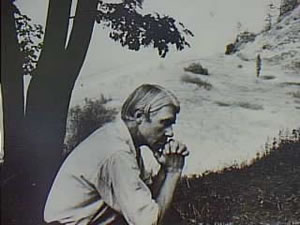
Carl Sandburg (6 januari 1878 – 22 juli 1967)
Zie voor nog meer schrijvers van de 6e januari ook mijn vorige blog van vandaag.
